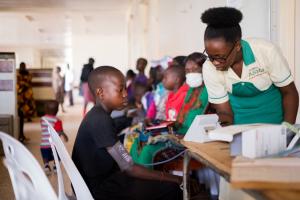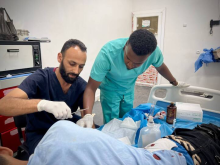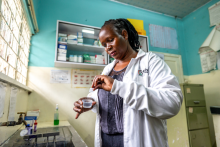Africa speaks out: WHO consultations bring urgency and hope to health worker migration crisis
Brazzaville, Congo – When health experts across the WHO African region, logged into the virtual WHO consultation on 30 July 2025, they knew the stakes were high. Across the continent, hospitals are losing nurses to overseas recruiters, clinics are short-staffed, and young medical graduates face the dilemma of staying to serve or leaving in search of better pay.
This isn’t just policy—it’s personal.
From Praia to Port Louis, governments and health professionals are sounding the alarm: Africa is losing too many of its trained health workers to international migration. And while global demand for medical personnel has soared in the wake of the COVID-19 pandemic, African countries are bearing the cost.
In response, the World Health Organization’s Regional Office for Africa has launched a series of consultations with its 47 Member States to revisit the WHO Global Code of Practice on the International Recruitment of Health Personnel. First adopted in 2010, the Code was designed to ensure fairness in how countries recruit health workers across borders. But fifteen years on, it needs a refresh—and Africa is determined to shape it.
Dr Adelheid Werimo Onyango, Director of Health Systems and Services at the WHO Regional Office for Africa underscored said: “These consultations represent a critical opportunity for African countries to ensure the Code truly reflects our regional realities and priorities,” noting that “ultimately, our goal is to ensure that the Code remains not just a document on a shelf, but a living, actionable instrument that guides international recruitment in ways that strengthen Africa’s health systems.”
The consultation brought together representatives from 30 countries. Their goal: to make sure Africa’s voice is heard loud and clear when the final report goes to the 156th WHO Executive Board. The consultation was guided by three key objectives: (1) to review the findings and recommendations of the Expert Advisory Group on the Code’s current relevance and effectiveness; (2) to provide concrete recommendations for strengthening the Code’s effectiveness in addressing both current and emerging health workforce challenges in Africa and globally; and (3) to build consensus on regional priorities and peculiarities that must be reflected in the revised Code.
For many participants, the discussion hit close to home. Several spoke of empty clinics in rural districts, of experienced doctors, laboratory experts and nurses departing overnight for contracts in Europe or the Gulf, of overstretched systems trying to do more with less.
“Through your recommendations and suggestions, you are laying a solid foundation for a stronger and more equitable health workforce across Africa,” said Dr James Avoka Asamani, Health Workforce Team Lead at the WHO Regional Office for Africa stressing the importance of providing feedback.
Many referenced the Africa Health Workforce Investment Charter, which recognizes that effective migration management is vital to addressing the region’s looming shortfall of 6.1 million health workers by 2030. Countries stressed that the revised Code must go beyond principles and offer enforceable guidance, especially in the face of aggressive international recruitment.
The heart of the consultations, however, wasn’t just policy reform—it was about people.
It was about a young doctor torn between duty and ambition. And it was about families across Africa who deserve quality care—delivered by professionals who stay.
In the coming weeks, WHO will continue gathering input from across the region. But one thing is clear—the African region is not sitting this one out. It’s leading the conversation. Because when it comes to health worker migration, the region knows the human cost all too well—and is ready to chart a new path forward.





